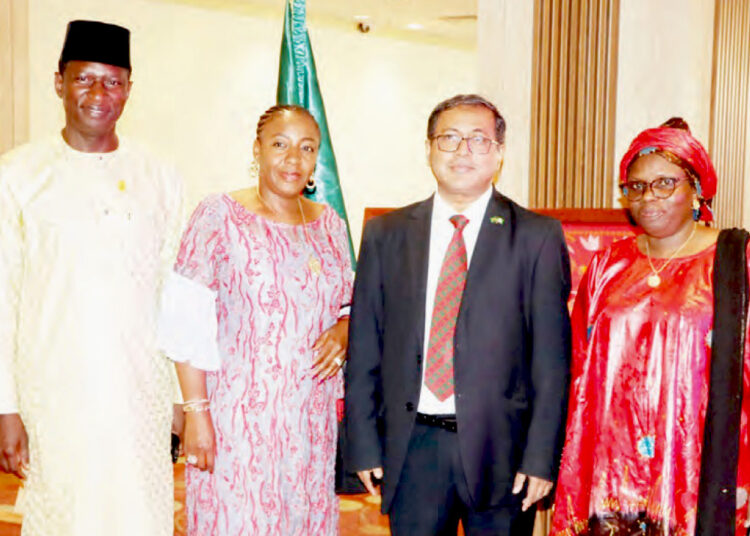The High Commissioner of Bangladesh to Nigeria, Masudur Rahman, has said that his country’s market is open to Nigeria’s agricultural products, which are in high demand.
In this Interview with INNOCENT ODOH, the Bangladeshi Envoy said his country is collaborating with Nigeria to boost the agricultural value chain through investment in processing and digital technology to enhance food security for mutual benefits
Nigeria and Bangladesh have had very cordial bilateral ties over the past 50 years. How much of that has translated into volume of trade and investment?
The bilateral relations between Bangladesh and Nigeria are rooted deeply in our historical similarity, in our values, ethos, ideas and in our mutual inherent dynamics. There are a lot of synergies and opportunities between our two countries. However, the opportunities have not been much explored and exploited and as a result the trade between Nigeria and Bangladesh has not picked up.
Nigeria’s exports to Bangladesh have actually dropped somehow. It is about 65 million dollars from about 100 million dollars and from Bangladesh to Nigeria the export has picked up a little bit. Few years ago in 2021 it was about 4 million dollars but today it is about 16 million dollars. So, that is a little move ahead and this is why we think that Bangladeshi products may be finding popularity in Nigeria.
The volume of trade may not be great at the moment but the prospects are immense in areas like garment, textile, pharmaceutical, and health care, ICT, soft agro- processing fields as well as leather goods, jut goods and many others.
Nigeria is a huge market for products in the garment sector. Do you have any arrangement to either export your textile materials or invest in Nigeria?
There is a mechanism of discussion and dialogue between the entrepreneurs of both countries under the auspices of a MoU between the Nigeria’s apex chamber of commerce body – the Nigerian Association of Chambers of Commerce, Industry, Mines, and Agriculture (NACCIMA) and Bangladeshi apex chamber of commerce body -the Federation of Bangladesh Chambers of Commerce and Industry (FBCCI). They actually meet under the aegis of the D8 Ministers Council on Trade.
Last year at a symposium organized by the Ministry of Agriculture and Rural Development, you made a pledge to promote agro- products in Nigeria through digital efforts and other forms of investment. How far have you gone with this?
I must say that there is huge interest in Bangladesh as well as in Nigeria and in the areas that you mentioned I think there are possibilities for collaboration between the two countries’ entrepreneurs to improve SMEs. We want to initiate short and midterm engagements to create meaningful businesses by investing in research; investing in exchange of trained experts and by bringing in skilled professionals from Bangladesh and it is possible because Nigeria has arable land areas.
We must collaborate in agriculture not only in farming but also in processing, conservation and storage and then follow up with internal and external markets to boost the value and supply chains.
We have two agreements on this matter, one is an umbrella agreement on agricultural collaboration, and another is agro-farming, contract farming and agro- business kind of agreements with the Nigerian side. We are looking forward to seeing these agreements signed.
Nigerians are also interested in the digitalization of the whole agriculture value chain. In what way can Nigeria leverage its ties with Bangladesh to enhance its digitalization efforts?
We are focused on digitalization and automation. Digitalization is the process whereby we fast forward the agro sector such as food processing and storage, to getting maximum benefit for the people through the implementation of the digitalized e-commerce platform, maintenance, transportation and distribution at the receiver end.
In Bangladesh there are a lot of agriculture digital apps used by the government as well as the private sector and sometimes NGOs. We have digitalized techniques, tools and applications that are so central to the whole system that can step up the kind of response between the agricultural industrial market and agricultural productive market. This is because in the agricultural productive market farmers in the field need to know the needs of the industry. These are the things that can bring about food security.
Nigeria is doing well with cassava and yam, which we need to back up with technology, especially in this globalized world. So, what is needed is collaboration among the developing countries. But this is not happening much within the developing world and that is my worry. But I am keen to see the D8 countries coming up to exchange their huge markets and reciprocate in terms of trade and commerce.
There are other agro- products Nigeria has in abundance such as ginger, cocoa seeds, cashew nuts, sesame seeds, soya beans, etcs. Are these products readily available in Bangladesh?
These products are not readily available, and we need them. Our traders are looking for them. We look forward to abandoning other sources of these products and hopefully the traders will be coming over to Nigeria for such agro- products. We are trying to reach out to the producers of certain things you mentioned like ginger and others.
Nigeria also has probably the world’s finest cocoa beans and coffee of different variants. Nigeria has huge opportunities in coffee and its brand can be made global.





